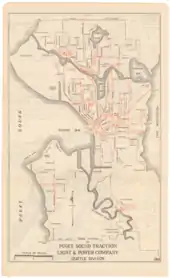Seattle Municipal Street Railway
The Seattle Municipal Street Railway was a city-owned streetcar network that served the city of Seattle, Washington and its suburban neighborhoods from 1919 to 1941. It was a successor to the horse-drawn Seattle Street Railway established in 1884, and immediate successor to the Puget Sound Traction, Power and Light Company's Seattle division. In 1898, Stone & Webster began forming the system out of smaller lines, the oldest of which had roots from 1884.
| Seattle Municipal Street Railway | |||||||||||
|---|---|---|---|---|---|---|---|---|---|---|---|
.jpeg.webp) Seattle Street Railway's first streetcar at Occidental Avenue and Yesler Way with Mayor John Leary and city officials in the fall of 1884 | |||||||||||
| Operation | |||||||||||
| Locale | Seattle, Washington | ||||||||||
| |||||||||||
| |||||||||||
| |||||||||||

By 1900, they had amalgamated 22 lines and gained a 40-year operating franchise. The system also included cable car lines on Madison Street and Yesler Way. In 1907, Stone & Webster also acquired the lease to the Everett streetcar system, and in 1912 it combined all of its transit and utility holdings in the area under a new company, the Puget Sound Traction, Power and Light Company (PSTP&L).[1] Years later, stripped of its rail lines, this became Puget Sound Energy.
On March 31, 1919, the city of Seattle purchased the entire Seattle division of PSTP&L's street railways, but the acquisitions were on terms which left the transit operation in financial trouble.[1] In 1939, a new transportation agency, the Seattle Transit System, was formed, which refinanced the remaining debt and began replacing equipment with "trackless trolleys" (as then known) and motor buses. The final streetcar ran on April 13, 1941. Seattle Transit, in turn, was absorbed by King County Metro in 1973.[2]
A modern streetcar system debuted in 2007, with the introduction of the South Lake Union Streetcar. It has since been expanded to include a second line, the First Hill Streetcar, which will be extended downtown to connect the two lines.
References
- Kershner, Jim (2019). Transit: The Story of Public Transportation in the Puget Sound Region. HistoryLink, Documentary Media. pp. 28, 32, 37. ISBN 9781933245553. OCLC 1084619121.CS1 maint: ref=harv (link)
- Crowley, Walt (February 10, 2000). "Street Railways in Seattle". historylink.org. Retrieved February 16, 2017.
Further reading
- Blanchard, Leslie (1969). The Street Railway Era in Seattle: A Chronicle of Six Decades. Harold E. Cox.
- Lane, Bob (1995). Better Than Promised: An informal history of the Municipality of Metropolitan Seattle. Seattle.
External links
![]()
- "Seattle's Street Railway System and the Urban Form" (PDF). washington.edu.
